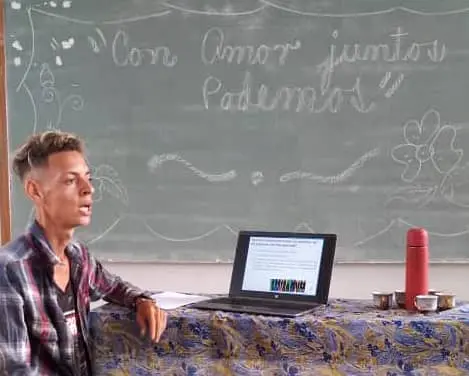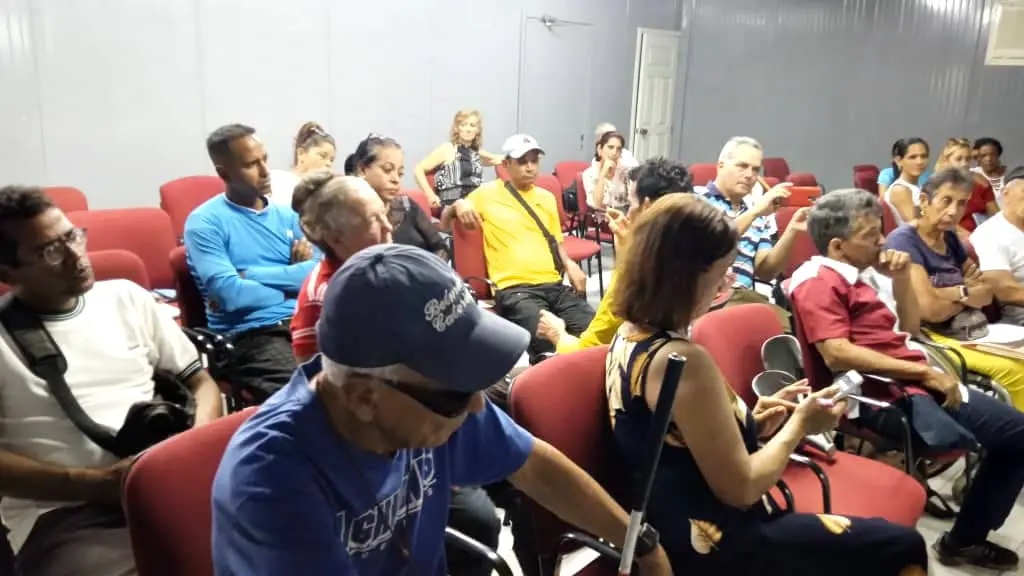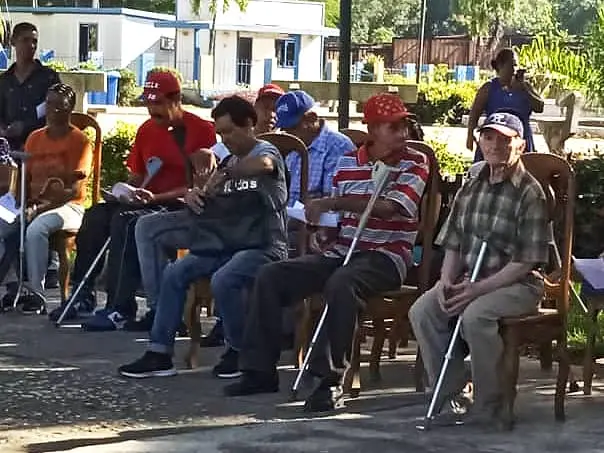Algunas palabras sobre
Capacitaciones en Masó
Capacitaciones en Masó
“On the fulfilment of the task of training and awareness on disability in Bartolomé Masó

A person seated, facing a laptop with a PPT image. In the background, a blackboard with the text: With love, together we can.

Group of people seated in a room, some of them with disabilities

People with physical disabilities sitting in a park with crutches in their hands
“On the fulfilment of the task of training and awareness on disability in Bartolomé Masó, within the Project: Participatory Cultures for Equitable Development between Cuba and the United Kingdom, the intention is to provide training and awareness on disability. This initiative aims to build knowledge on these topics based on the wisdom of people with disabilities, the missions of associations, health and education professionals, and social workers. Initially directed at the management team of the Municipal University Center (CUM), the effort will later extend to families, local councils, institutions, and organizations in the municipality, fostering greater sensitivity and understanding toward this population group.”
To achieve this goal, a training program was structured with specific actions to be carried out. The first executed action was a summer workshop on sign language, conducted by members of the deaf community in the municipality. In November, two highly significant actions took place: a scientific event titled “Participatory Cultures, Disability, Training, and Social Work.” Thirty participants attended, including nine individuals with disabilities who played a central role. They shared ideas on how to address disability in various aspects of family and social life, recounted moving stories about overcoming disability, and reaffirmed their willingness to contribute to training efforts wherever needed. The event also included association presidents, social workers, student scientific group members, and the management team from the Municipal University Center, who presented tools for future studies.
In celebration of December 3rd, the management team of the Municipal University Center (CUM) organized an awareness activity at Bartolomé Masó Park, located in the municipality’s main area. During this event, people with disabilities showcased their skills in martial arts and table tennis. The work with children who have intellectual and visual disabilities was also highlighted through theater, music, and dance performances. Additionally, there were pastry and carpentry exhibitions featuring members of the deaf community from the Turquino Plan. Informational pamphlets related to how we should interact with individuals with disabilities in various situations were distributed. Finally, the achievements of the projects “Learning to Grow” and “Labor Integration for People with Disabilities” were publicly acknowledged.
In December, the theme of disability and inclusion was addressed from the perspective of the Convention on the Rights of Persons with Disabilities. In January, training took place through a workshop led by the municipal methodologist for Special Education, focusing on educational inclusion and the transformation process in Special Education. Participants expressed high levels of satisfaction, recognizing these spaces as valuable practices in support of disability. These initiatives foster co-creation and a dedicated effort to train and raise awareness among the Masó community, ultimately aiming for an improved quality of life for individuals with disabilities
Testimonials
This activity was a good testimony that there is a lot of willingness to participate and demonstrate that great things can be done with what we have in order to modify, to some extent, the daily life and spirituality of people with disabilities. These individuals need to be attended to, understood, and valued in all contexts. This space shed light on the fact that people with disabilities should be the direct trainers based on their personal experience alongside professors of the Municipal University Center and social workers
Valuable learnings emerged regarding the perspective one should have on disability, inclusion, accessibility, full life, and rights. Not only were tools for training presented, but there was also significant knowledge construction based on lived experiences. Additionally, there were demonstrations of sensitivity and commitment from those who have supported individuals with different conditions—social workers, activists, INDER and Culture methodologists. The academic community contributed insights on how to proceed and explore the topic. In summary, it was a blend of essential knowledge to work together
